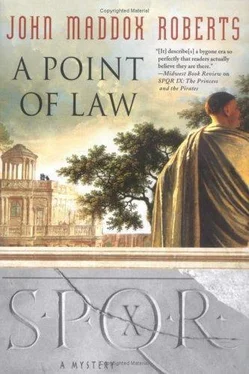John Roberts - A Point of Law
Здесь есть возможность читать онлайн «John Roberts - A Point of Law» весь текст электронной книги совершенно бесплатно (целиком полную версию без сокращений). В некоторых случаях можно слушать аудио, скачать через торрент в формате fb2 и присутствует краткое содержание. Год выпуска: 0101, ISBN: 0101, Издательство: St. Martin, Жанр: Исторический детектив, на английском языке. Описание произведения, (предисловие) а так же отзывы посетителей доступны на портале библиотеки ЛибКат.
- Название:A Point of Law
- Автор:
- Издательство:St. Martin
- Жанр:
- Год:0101
- ISBN:9780312337254
- Рейтинг книги:5 / 5. Голосов: 1
-
Избранное:Добавить в избранное
- Отзывы:
-
Ваша оценка:
- 100
- 1
- 2
- 3
- 4
- 5
A Point of Law: краткое содержание, описание и аннотация
Предлагаем к чтению аннотацию, описание, краткое содержание или предисловие (зависит от того, что написал сам автор книги «A Point of Law»). Если вы не нашли необходимую информацию о книге — напишите в комментариях, мы постараемся отыскать её.
A Point of Law — читать онлайн бесплатно полную книгу (весь текст) целиком
Ниже представлен текст книги, разбитый по страницам. Система сохранения места последней прочитанной страницы, позволяет с удобством читать онлайн бесплатно книгу «A Point of Law», без необходимости каждый раз заново искать на чём Вы остановились. Поставьте закладку, и сможете в любой момент перейти на страницу, на которой закончили чтение.
Интервал:
Закладка:
“How will you accomplish that?” I asked him. Expulsion by the censors usually meant a five-year wait until a more sympathetic pair took office. Then you had to start at the bottom again, getting elected to another quaestorship and serving in that office for a year to qualify for the Senate.
“Appius won’t stay in office any longer than it takes him to do as Aemilius Paullus says. He’ll have no excuse, and he’ll have other things to do. I’ll ask Caesar to get me a quaestorship without going through the elections again. He can get the comitia to grant me one by acclamation. He did it for Marcus Antonius. A year of that and I can resume my seat in the Senate.” In a few seconds Sallustius had figured out a way to extricate himself from a political predicament that might have discouraged a less flexible man. He was not without talent.
“There, you see?” said Aemilius Lepidus Paullus. “Being a friend of Caesar has its advantages.” He lost his smile. “Bribery! As if I would not support Caesar without being bought! The Aemilii and the Julia Caesares have been allies for generations.”
I could not vouch for that, but it was clear that the charge of bribery rankled him. Caesar’s munificence could be confusing. Sometimes he simply bought a man’s allegiance, as had clearly been the case with Curio. But just as often he was generous to a man whose support was already unquestioned.
“How will you handle next year’s business?” Sallustius asked him. “It’s clear you are going to have a hostile colleague in office.”
“Much will depend upon how great my support is. I can count upon little from the Senate.”
“You can count upon mine,” Sallustius said, “but it sounds as if I’ll be devoting myself to literary pursuits at my country house.”
“Then I shall have to look to the Popular Assemblies, it seems. That’s where the real power is these days.”
And there it was again: class against class. War was coming.
8
"Octavia said something important,” I told Julia.
“What was it?”
“I don’t remember.”
“That’s a great help.” We sat eating dinner while sounds of revelry made their way in through the door and over the walls. Everyone was entertaining Caesar’s soldiers, and the party had spilled out into the streets and squares where tables had been set up and the wine flowed. I wished I could be out there with them.
“I mean, I remember everything she said. I just can’t put my finger on what did not ring true.”
“Sleep on it,” Julia advised. “Perhaps, like Callista, you’ll be visited by a god who will sort this out for you.”
“It could happen,” I admitted. “Speaking of that learned lady, did she come up with a solution for the code?”
Julia shook her head. “No, I left her house shortly after you did. I wanted to give her privacy to work on it.”
I wondered what the two had really been talking about. Me and my shortcomings, no doubt.
There was a pounding on the door outside and a few moments later my father came in, accompanied by Scipio and Nepos. Julia served wine and retired, none too happy about it. These men were too old-fashioned to talk politics with a woman in the room.
“What have you learned?” Father demanded. I gave a succinct report of my doings, and he made a disgusted sound. “You’ve wasted your time while we’ve been lining up support for you.”
“No, I find this interesting,” said Metellus Scipio. “You’ve gathered a lot of evidence here and there, Decius. Have you drawn any conclusions?”
“Just a few minor conclusions that may lead to the main one.”
“Such as?” said Nepos.
“Fulvius was killed by three or more highly placed men.”
“How is that?” Father asked. “The number of weapons says multiple assailants and the bugger was held from behind, I’ll grant your Greek friend knows what he’s talking about there. What makes you think they were well-born or important and not just street scum?”
“The clumsiness of the execution,” I told them. “What grown Roman man doesn’t know how to kill a man with a knife? It’s part of every soldier’s training, and even those who never served in the legions see it done in the arenas, both with straight blades and curved sicas . This man was killed by a multitude of shallow cuts, like some wretch executed by an Oriental monarch. And the cuts were administered by straight blades, not well suited to the task.”
Scipio nodded. “And a gentleman would never use a sica , even to commit murder.”
“Precisely. And there was this: Everybody wanted to participate, but nobody wanted to be the one to administer the deathblow.”
“You’ve lost me,” Father said.
“We’ve seen it before,” I told them. “The essence of conspiracy is to take part, but also to make sure that the others take an equal part. Look at the absurd lengths to which Catilina’s men went to make sure that every one of them was liable to the death penalty. That way nobody could back out, and nobody could squeal on the others.”
“So each administers a little bit of the death, eh?” Nepos said.
“Picture yourself as part of such a conspiracy,” I began.
“Never!” said Father.
“Bear with me. This is the way I think. If you had conspired with some colleagues to murder a prominent man, would you rush right up and cut his throat, the easiest way to do it? No, because you’d know exactly what the others would do: They’d back away with looks of horror, pointing at you and saying, ‘Ohhh, look at what he did!’ Imagine how embarrassed you’d be. No, you give the poor bastard a cut, then you back away and make sure that the rest do at least as much. Only then does someone administer the deathblow.”
They considered this for a while. They weren’t accustomed to my sort of reasoning. Finally, Nepos spoke up.
“I can see men conspiring this way against a really great man, a Pompey or a Caesar. But why a nobody like Marcus Fulvius? He was nothing.”
“Yes,” I said, “but what might he have become?”
“Decius,” Scipio said impatiently, “you are not Socrates, and we are certainly not your adoring students. Stop asking questions and give us some answers!”
“Hear, hear!” chimed in the other two. I loved nettling them like this.
“Just this morning, while conferring with the Greek lady who is working on the code for me, we talked about what family names and bloodlines mean to us Romans, to the common plebs no less than to the patricians and the aristocrats. Marcus Fulvius was the brother-in-law of Clodius, whom the commons still mourn. He and his sister, Fulvia, are also the grandchildren of Caius Gracchus. The commons revere nobody the way they revere the name of Caius and Tiberius Gracchus.”
“Gracchus!” Father said. “I’d forgotten that. Scipio, what’s the connection?” Scipio, with his patrician antecedents, was the acknowledged expert. He could reel off Roman lineages the way most of us could recite the bloodlines of chariot horses.
“The wife of Caius Gracchus was a Licinia, of the Licinius Crassus line. Their daughter was Sempronia and she married-let me see-Fulvius Flaccus. The slut Fulvia and the dead fool must be their children. I think there’s another.”
“Manius Fulvius,” I said. “He’s duumvir of Baiae. Now tell me who was the mother of the Gracchi?”
“Cornelia,” they all said at once. This took no great feat of memory. Cornelia, mother of the Gracchi, was the most famous Roman mother since Rhea Silvia, mother of Romulus and Remus. Predictably, it was Metellus Scipio who first grasped the implications.
“Jupiter! Cornelia was the daughter of Scipio Africanus, my own ancestor!”
Читать дальшеИнтервал:
Закладка:
Похожие книги на «A Point of Law»
Представляем Вашему вниманию похожие книги на «A Point of Law» списком для выбора. Мы отобрали схожую по названию и смыслу литературу в надежде предоставить читателям больше вариантов отыскать новые, интересные, ещё непрочитанные произведения.
Обсуждение, отзывы о книге «A Point of Law» и просто собственные мнения читателей. Оставьте ваши комментарии, напишите, что Вы думаете о произведении, его смысле или главных героях. Укажите что конкретно понравилось, а что нет, и почему Вы так считаете.









